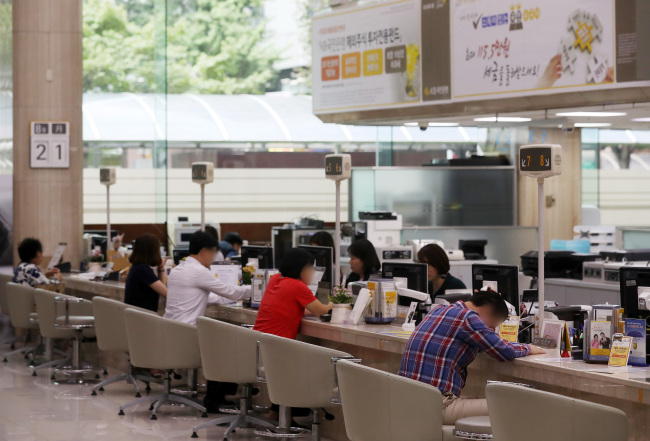In the wake of the Moon Jae-in government’s reinforced restrictions on housing loans, the increase in mortgage loans has slowed down while credit loans made a record leap in August, data showed Tuesday.
According to the Bank of Korea’s monthly data on financial market trends, the balance for household loans stood at 744.2 trillion ($658.4 billion) as of the end of August, up 6.5 trillion won from the previous month.
The on-month increase was down 200 billion won from that of July and down 2.1 trillion won from the same month last year.
The slowdown was attributable to the deceleration in the mortgage loan sector, a result of the government’s set of measures announced on Aug. 2 to curb real estate speculation.
The mortgage loan balance totaled 557.7 trillion won as of the end of August, up 3.1 trillion won up from a month earlier. This on-month margin of increase was about half that in the same period last year.
 |
Customers sit at bank windows for loan consultation. (Yonhap) |
“It has not been long enough since (the government) tightened the ceilings on loan-to-value and debt-to-income ratios of banks, so it is yet too early to confirm the direct consequences (of the Aug. 2 measures) on household loans,” said an official of the BOK.
Starting from Aug. 23, the LTV and DTI ratios in key bubble-prone areas -- particularly Seoul, Gwancheon and Sejong -- were limited to 40 percent.
In contrast, an uptrend was detected in nonmortgage loans, including credit loans.
The total balance of nonmortgage loans reached 185.7 trillion won as the end of August, up 3.4 trillion won from July, marking the largest on-month increase since the central bank started compiling data in January 2008.
Previously, 2.7 trillion won in November last year was the largest on-month leap ever.
“The recent launch of some internet-only banks has triggered an uptrend in credit loans,” the BOK said in its press release, referring mostly to Kakao Bank, the banking arm of the nation’s IT giant Kakao which began operations in late July.
The new market player executed loans worth 1.5 trillion won in total during its first month in operation, according to company officials.
Conventionally, credit loans account for some 60 percent of nonmortgage loans, but this ratio is likely to have increased in August due to such momentum, the BOK explained.
“Despite the visible increase in credit loans, the default rate in that sector is relatively low,” said an official of the BOK’s market management team, dispelling concerns of credit risks.
By Bae Hyun-jung (
tellme@heraldcorp.com)







![[Today’s K-pop] Blackpink’s Jennie, Lisa invited to Coachella as solo acts](http://res.heraldm.com/phpwas/restmb_idxmake.php?idx=644&simg=/content/image/2024/11/21/20241121050099_0.jpg)
